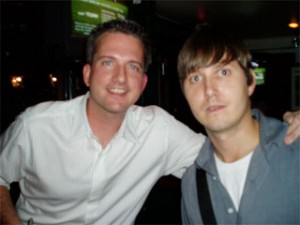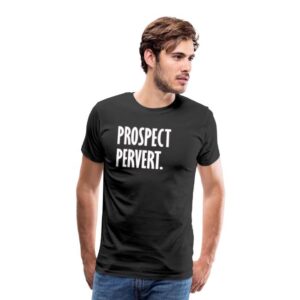 I will admit that part of the reason that Bill Simmons’ big book of basketball nonsense is currently the #1 Bestseller on the New York Times non-fiction list is that I bought a copy of it. As you well know, I get big ideas from time to time and on rare occasion I actually follow through with them. I was going to buy the much hyped book, read it and review it for you, the home reader.
I will admit that part of the reason that Bill Simmons’ big book of basketball nonsense is currently the #1 Bestseller on the New York Times non-fiction list is that I bought a copy of it. As you well know, I get big ideas from time to time and on rare occasion I actually follow through with them. I was going to buy the much hyped book, read it and review it for you, the home reader.
But here’s the thing. I can’t. I enjoy the NBA as much as the next guy, and more than most. I like to think I have some idea of how the game is played, and I can watch Kirk Hinrich miss layups for hours. Truth is, however, there are a number of people out there who understand the game a lot better than I do. Our pal Kelly Dwyer is certainly one of them. That’s why I read young Kelly’s stuff every day over there on the Yahoo! sports blog thingy. He’s funny, he has a point and I learn things.
Maybe that’s why I’m stuck about 100 pages into Simmons’ 700 page self-aggrandizement festival of a “book.” I’m not learning anything, it doesn’t appear to have a point, but I will certainly concede that it is on occasion funny, and at times, laugh-out-loud so.
But no book worth reading should ever feel like work. Though Lord knows, I find myself spending time on other things that used to be fun, and that are supposed to be entertaining, but instead have become work. Watching House and CSI these days fall into that category.
So, I was afraid that I had failed you, and wasted the $16 (Borders gave me 50% off, because they’ve finally realized that people no longer go into their stores to buy books, they are just there to drink coffee, hang out in the jazz music section–which they pronounce “yazz”–and subtly try to rub one out between the stacks of the religious studies section and a six foot high wall of Rachel Ray cookbooks.
But, Deadspin came to my rescue.
Belatedly. Because they had come to my anti-rescue just days earlier when their former caretaker, the famously untalented Will Leitch (it’s pronounced “leech” for a reason) apparently got Simmons and his work confused with that of Voltaire.
Leitch spent several paragraphs talking about how important Simmons’ writing was, and how it changed the world forever. He even talked about how he and some other loser watched the first episode of The Jimmy Kimmel Show only because Simmons was a writer. One of a dozen writers on a 60 minute talk show. They had to be disappointed in the nearly complete lack of references that night to Saved By the Bell and The Karate Kid.
But then last night, Deadspin posted the first actual review of Simmons’ book that I’ve seen. Written by sports writer and author Charles P. Pierce, it might just be the most spot-on book review of all-time. Well, I mean, since my one line brilliance on the back cover of the hard cover version of Kevin Kaduk’s “Wrigleyworld” book. (You might notice that if you pick up a paperback copy of the book that you won’t find me on the back cover. But I’m not bitter. Even if Kevin has long wondered what caused that apartment fire of his a couple of years ago.)
Pierce’s review takes Simmons to task for some key problems with the book, and the first should have been obvious from the start.
- It’s too fucking long. Seven hundred pages? On the NBA? I like the NBA and I don’t want to read 700 pages on it. You write 700 pages to carve out all of the extra crap you don’t need and you end up with a book half that size that’s actually good. But apparently nobody at ESPN Books (surprise!) had the balls to actually edit this book. It’s like the Michael Douglas character in “Wonder Boys” who is writing his second book but can’t figure out how to end it, so he just writes and writes and writes. Only this time, somebody actually published it.
- I’m not sure just how much Simmons really knows about the NBA. It’s more than most people, but it’s not nearly as much as he thinks he does. But that’s always the problem. Whether you are reading them, watching them, listening to them, or god forbid–talking to them, the people who are always the most irritatingly wrong about any subject are the ones who assume they have a greater grasp of the subject than they do.(*) Simmons confidently plows through this book (well, the first seventh of it, anyway) as though you, the reader, know nothing about basketball, so he will enlighten you. I kept closing the book and checking to see if was written by Simmons alone, or if Glenn Beck had served as a co-author. It’s like Kevin Pelton’s Twitter review of the book. “Like a great 700-page NBA argument, except you never get to argue back.” Except without the “great” part.
(*) — Let me use a Simmons-style footnote to point out that during that long sentence many of you muttered the words ‘kettle’ and ‘black.’Â Didn’t you?
Simmons made a huge deal out of his Gus Johnson orchestrated (*) sit-down with Isiah Thomas in Las Vegas. Don’t let me spoil it, but even in his one-sided retelling of the event, Simmons completely acted like a pussy and let Isiah snow him with some meaningless existential hooey that should have gotten Thomas punched in the face by Albert Camus.
(*) — And if you’ve never heard the Gus Johnson Orchestra, you are missing out.
What is apparent is that the book is about two things for Simmons.
- He sees it as a 700-page audition to become an NBA general manager. Sometimes at night when he lays his head down on his pillow (and fusses around trying to get those hilariously low-set ears of his some cushion), he thinks about how great it will be when some NBA owner reads his book, realizes that Bill is a basketball savant, and hires him to run his team. It’s not like being the general manager of a professional sports team requires any ability to manage people, manage finances, deal with unreasonable agents, or deal with 19 year old millionaires who spend their offseasons fathering children, buying homes and cars they can’t afford and getting busted with enough booze and dope in their car to fuel an entire Phish concert. I would think that the way to become a successful GM isn’t to get a job in an NBA front office and work your way up. I think it’s probably just write a really thick book and then act like it’s unconscionable that no team has the foresight to let you run (ruin, whatever) them.
- He feels constrained by his ESPN.com columns because they are edited and there are things he can’t get away with writing. So the book starts to have the feel of Bill trying to find ways to work words in that he couldn’t ever get posted on ESPN.com. It’s like a 12 year old kid hanging out for the day with his older brother’s friends. He realizes nobody’s going to care if he swears, so he starts awkwardly working those words into whatever they are talking about just because he can. And if you don’t think there are perils to not having anyone edit your work…you’ve seen the mess that goes on here. The only thing worse than a bad editor is no editor at all. Actually that has to be other way around. A bad editor can really screw things up.
So we get what we get. Seven hundred pages of self-aggrandizement. I’m just glad Charles Pierce finished it (at least he claims he did), because it officially means I no longer have to.
So do yourself a favor. If you want to follow the NBA and be entertained, don’t buy this book. Just read Kelly Dwyer. But for God sakes, stay away from Marc Stein. Just stay away.
And if you are like me, and you can understand to a degree how Bill Simmons got to be so popular–you must still have no idea how Leitch gets work. Has he ever written anything memorable? Ever?
But don’t worry about people like Pierce writing negative things about Simmons’ book. Bill knows how to take it in stride. He’s got thick skin (*), and a huge pile of cash to roll around in to console himself.
(*) — Says the guy who Simmons banned from his Twitter feed for promoting a Colin Cowherd appearance on Simmons’ podcast as “An insufferable douche-off for the ages.”


If there could be an insufferable douche-off for the ages without Chris Berman, that would be it. But there cant.
Just wait until I tell J-Bug and Hench that you said mean things aboot our Billy!
I have a sudden stifling feeling like our world just got a LOT smaller. Why is that?
This post is like Florida Evans just went to the Jefferson’s house for dinner and Zach and Kelly show up out of nowhere. Then Boner and Mike Seaver come knocking on the door and ruin the party. CELTICS…..DANIEL LARUSO….
My ears are not too low on my head, my face is too high.
You are a bully, just like Billy Zabka. You will get yours!
Me? I’m just rich. So, hah.
For fuck sake, just buy my book. It’s actually readable:
http://www.amazon.com/Art-Beautiful-Game-Thinking-Illustrated/dp/1439110212/ref=sr_1_1?ie=UTF8&s=books&qid=1258146901&sr=8-1
The thing about Bill’s book of basketball, is that it’s not about basketball.